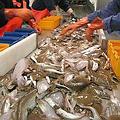 保育團體世界自然基金會(WWF)德國分會發表了一份報告,指出北海每年至少有100萬公噸的魚類與海洋生物從船上被丟棄。
保育團體世界自然基金會(WWF)德國分會發表了一份報告,指出北海每年至少有100萬公噸的魚類與海洋生物從船上被丟棄。
世界自然基金會表示棄置的總量大約是北海總漁獲量的三分之一,超越2007年歐盟的評估,歐盟原本估計在北海被拖網漁船捕獲的所有魚類中,有40%到60%的漁獲是被丟棄。
這份名為《海洋生物並不是垃圾》的報告中指出,因太小未達到捕撈配額標準、或因漁民沒有撈捕該物種配額而遭丟棄的魚類並沒有被準確的測量。這表示過度捕撈的程度可能比現在官方數據所認定的更為嚴重。
世界自然基金會呼籲歐盟全體應逐步禁止丟棄混獲(bycatch)的行為。(編按:混獲是指漁民捕撈到目標物種以外的魚種或捕獲年輕、未達性成熟的目標魚種。)
9月,在布魯塞爾舉行的會議中,來自歐盟與非歐盟會員─挪威等地的125位科學家、行政官員與控管專家皆同意對具體作為的「迫切需求」,例如即刻停止並增進捕撈裝置對漁獲的篩選能力,用來處理北海捕撈棄置的問題。
儘管雙方皆同意要完全解決棄置的情形是非常困難的,但也認為當前對於珍貴食物資源的極度浪費情形,不能任由繼續發生。
歐盟近日宣布有88%的歐盟漁業資源過度捕撈,相較於全球平均的25%。報告中指出混獲是造成過度捕撈的主因。
9月,由蘇格蘭政府在愛丁堡舉行的特別《棄置魚獲高峰會》(Fish Discards Summit)中提到,每年蘇格蘭地區漁民被迫丟掉的漁獲,價值高達四千萬英鎊。
高峰會中由蘇格蘭政府發起一項提議,目的是改變那些歐洲的規定,將那些迫使漁民丟棄的漁獲,也能夠運上岸銷售。
許多因素造成漁民必須放棄大量可銷售的漁獲,尤其是北海鱈魚。有個重要的原因是北海鱈魚可用的配額與其增加的蘊含量無法互相配合。
蘇格蘭地區首長表示如果增加北海鱈魚的配額,被丟棄的魚也會減少。他表示若要減少棄置撈捕的魚獲,減少漁船捕獲總量並且增加登陸的數量是確保平衡的重要一環。
世界自然基金會希望有個全歐洲的棄魚禁令與混獲行為的計畫。該保育團體表示「將來每一條被捕獲的魚都應該被運上岸並分配到捕撈配額中。」
同時世界自然基金會也希望見到漁民們肩負起使用較好捕魚技術的義務。該保育團體也表示某些漁民可能因使用較好的技術而減少將近90%的混獲。
蘇格蘭政府也提議製造篩選能力更佳的魚網,只有比規定尺寸更大的魚才會被捕獲。其次,當特定魚種在某地大量出現時,蘇格蘭政府會依其創新、及時的封閉計畫暫時封鎖該海域,或限制漁船能夠停留在海上的天數。
At least a million metric tonnes of fish and other sea animals caught in the North Sea are tossed overboard every year, according to a new report from WWF-Germany, the German chapter of the global conservation organization.
The discards amount to about one-third of the entire North Sea catch, says WWF, an estimate outdone last year by the European Union, which estimated that between 40 and 60 percent of all fish caught by trawlers in the North Sea is discarded.
The report, "Sea Creatures Are Not Rubbish," says that discards of fish that are too small to meet catch quotas or species for which the fishermen have no quota are not accurately measured. This could indicate an even greater level of over-fishing is happening than is currently recognized in official estimates.
WWF is calling for a gradual ban on the practice of discarding bycatch across the entire European Union.
At a meeting in Brussels in September, scientists, administrators and control experts from the EU and Norway, which is not an EU member state, agreed on the "urgent need" to consider concrete measures such as real-time closures and improved gear selectivity, to tackle the problem of discards in the North Sea.
While both parties agree that it is very difficult to entirely eliminate discarding, they have recognized that the current huge waste of valuable food resources cannot be allowed to continue.
The European Union recently declared that 88 percent of the fisheries stocks of the EU are overfished, compared with 25 percent on average globally. Bycatch is a major contributor to overfishing, the report points out.
A special Fish Discards Summit hosted by the Scottish Government in Edinburgh in September heard that fishermen in Scotland are being forced to throw away up to �40 million worth of fish every year.
The summit kicked off a campaign by the Scottish government to change some of the European rules which force trawlermen to throw away fish which could be landed and sold.
There are a number of reasons why fishermen are currently having to discard large amounts of marketable fish, particularly North Sea cod. One important reason is the mismatch between the quota available for North Sea cod and the increased abundance of the stock.
The Scottish minister says if North Sea cod quotas were increased, fewer fish would be discarded. Making sure the fleet catches less overall - as well as landing more - is an important part of the equation when it comes to reducing discards, he said.
WWF is calling for a European-wide discard ban and a bycatch action package. "In the future every fish caught should be landed and allocated to the catch quota," says the conservation organization.
At the same time, WWF would like to see fishermen obligated to use better catch technologies. The conservation group says the bycatch in some fisheries could be reduced by up to 90 percent with better technology.
Scottish government is proposing making fishing nets more selective so that only fish above the minimum landing sizes are caught. Secondly, the Scots would close areas of the sea on a temporary basis where high abundances of certain species are found as has been happening under Scotland's innovative real-time closures scheme or restricting the number of days a boat is allowed to spend at sea.
全文及圖片詳見:ENS



